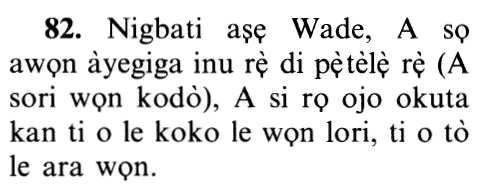11vs82
Select any filter and click on Go! to see results
فَلَمَّا جَاء أَمْرُنَا جَعَلْنَا عَالِيَهَا سَافِلَهَا وَأَمْطَرْنَا عَلَيْهَا حِجَارَةً مِّن سِجِّيلٍ مَّنضُودٍ
Falamma jaa amruna jaAAalna AAaliyaha safilaha waamtarna AAalayha hijaratan min sijjeelin mandoodin
Index Terms
Click to play
Yoruba Translation

Hausa Translation
Sa´an nan a lõkacin da umurninMu ya je, Muka sanya na samanta ya zama na ƙasanta, kuma Muka yi ruwan duwãtsu a kanta (ƙasar Lũɗu) daga taɓo cũrarre.
Asbabu n-Nuzuul (Occasions of Revelation)
The Town of Lut's People is overturned and Their Destruction
Allah, the Exalted, says,
فَلَمَّا جَاء أَمْرُنَا ...
So when Our commandment came,
This happened at sunrise.
... جَعَلْنَا عَالِيَهَا ...
We (turned it)...),
The city of Sadum (Sodom)
... سَافِلَهَا ...
upside down,
This is similar to Allah's statement,
فَغَشَّـهَا مَا غَشَّى
So there covered them that which did cover (torment with stones). (53:54)
... وَأَمْطَرْنَا عَلَيْهَا حِجَارَةً مِّن سِجِّيلٍ مَّنضُودٍ ﴿٨٢﴾
and rained on them stones of clay, in an array.
This means, "We rained upon it with stones made of Sijjil.''
Sijjil is a Persian word meaning stones made of clay.
This definition has been mentioned by Ibn Abbas and others.
Some of the scholars said that it (Sijjil) derived from the word Sang, which means a stone.
Some others said it means Wakil, which is clay.
In another verse Allah says,
حِجَارَةً مِّن طِينٍ
the stones of clay, (51:32)
This means clay made into strong, hard stone.
Some of the scholars said it means baked clay.
Al-Bukhari said,
"Sijjil means that which is big and strong.''
Concerning Allah's statement,
مَّنضُودٍ (in an array).
Some of the scholars said that Mandud means the stones were arranged in the heavens and prepared for that (destruction).
Others said,
This word means that some of them (the stones) followed others in their descent upon the people of Lut.
Concerning the statement,
مُّسَوَّمَةً ...
Marked,
meaning the stones were marked and sealed, all of them having the names of their victims written on them.
Qatadah and Ikrimah both said,
"Musawwamah means each stone was encompassed by a sprinkling of red coloring.''
The commentators have mentioned that;
it (the shower of stones) descended upon the people of the town and upon the various villages around it. One of them would be speaking with some people when a stone would strike him from the sky and kill him while he was among the people. Thus, the stones followed them, striking the people in the entire land until they destroyed them all. Not a single one of them remained.
... عِندَ رَبِّكَ ...
...from your Lord;
يقول تعالى " فلما جاء أمرنا " وكان ذلك عند طلوع الشمس " جعلنا عاليها " وهي سدوم " سافلها " كقوله " فغشاها ما غشى " أي أمطرنا عليها حجارة من سجيل وهي بالفارسية حجارة من طين قاله ابن عباس وغيره وقال بعضهم : أي من سنك وهو الحجر وكل وهو الطين وقد قال في الآية الأخرى حجارة من طين أي مستحجرة قوية شديدة وقال بعضهم مشوية وقال البخاري سجيل : الشديد الكبير سجيل وسجين اللام والنون أختان وقال تميم بن مقبل : ورحله يضربون البيض صاحبة ضربا تواصت به الأبطال سجينا وقوله" منضود " قال بعضهم : منضودة في السماء أي معدة لذلك وقال آخرون " منضود " أي يتبع بعضها بعضا في نزولها عليهم .
"فلما جاء أمرنا" بإهلاكهم "جعلنا عاليها" أي قراهم "سافلها" أي بأن رفعها جبريل إلى السماء وأسقطها مقلوبة إلى الأرض "وأمطرنا عليهم حجارة من سجيل" طين طبخ بالنار "منضود" متتابع
أي عذابنا .
I'raab - grammatical analysis of the Qur'an
«فَلَمَّا» الفاء استئنافية ولما الحينية ظرف زمان.
«جاءَ أَمْرُنا» ماض وفاعله ونا مضاف إليه.
«جَعَلْنا عالِيَها» ماض وفاعله ومفعوله الأول والهاء مضاف إليه والجملة لا محل لها لأنها جواب لما.
«سافِلَها» مفعول به ثان و الهاء مضاف إليه.
«وَأَمْطَرْنا» الواو عاطفة وماض وفاعله والجملة معطوفة.
«عَلَيْها» متعلقان بأمطرنا.
«حِجارَةً» مفعول به.
«مِنْ سِجِّيلٍ» متعلقان بصفة لحجارة.
«مَنْضُودٍ» صفة ثانية لحجارة والجملة معطوفة.
